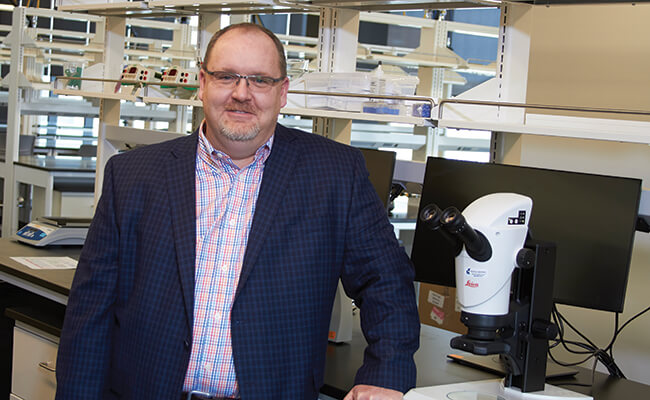The grant funding will support research related to Alzheimer’s disease as well as musculoskeletal disorders.
By Joseph A. Cantlupe
St. Louis College of Pharmacy faculty conducting research in the Center for Clinical Pharmacology have been awarded more than $6.3 million in grant funding from the National Institutes of Health (NIH) and the U.S. Department of Defense to support projects focused on the treatment of Alzheimer’s disease and musculoskeletal disorders. The NIH has provided more than $4 million to support two Alzheimer’s-related initiatives. The funding includes a $3.7 million grant that will fund research designed to examine REV-ERB nuclear receptors and their ability to help reduce inflammation of the nervous system and improve cognitive function in those with Alzheimer’s and, potentially, other neurodegenerative disorders associated with neuroinflammation. Dr. Tom Burris, vice president for research and Alumni Chair in Pharmaceutical Education, is serving as the principal investigator on the project.
In addition, Burris has been awarded more than $400,000 from NIH to investigate the role of ROR nuclear receptors in regulating critical inflammatory pathways in the brain. Burris will collaborate with Dr. Erik Musiek, associate professor of neurology at the Washington University School of Medicine, to study these pathways that are regulated by the inflammasome and have been found to be overactive in those with Alzheimer’s disease. This knowledge, along with the findings of previously conducted research that determined ROR nuclear receptors can be used as drug targets to inhibit the inflammasome, will allow researchers to formulate drug compounds designed to reduce inflammasome activity in the brain.

“Our Alzheimer’s research is exciting because we are looking at developing new and improved drug compounds to treat this disease that affects so many,” Burris said. “While there is no cure for Alzheimer’s yet, our work will play an important role in the creation of drugs that can reduce or eliminate cognitive decline and suppress the brain inflammation we know is occurring in those suffering from the disease.” In addition to new funding from NIH, college faculty at the center have received a three-year, $2.3 million grant from the Department of Defense that will support research focused on the development of therapeutic compounds to treat or prevent overuse and traumatic injuries and treat musculoskeletal injuries, namely amongst members of the military.
Specifically, the research will focus on the creation of drug compounds designed to accelerate muscle recovery, decrease muscle atrophy and help those who are immobilized maintain muscle mass. Burris and Dr. Bahaa El-Gendy, assistant professor of medicinal chemistry at the college, will serve as the principal investigators on the project.
“This is important research because the drug compounds we are developing have the potential to positively impact the health and quality of life of those in the military community by providing faster recovery times and improved treatment options for those who are severely injured in combat or during training,” Burris said. “In some cases, these drugs have the potential to reduce the healing time for severe muscle injuries by 50 percent, and that’s a big deal when it comes to preventing infection and reducing the amount of downtime that our military members can face.”
NIH grant funding will support Alzheimer’s research by Dr. Tom Burris that will lead to creating drugs that can reduce or eliminate cognitive decline.

